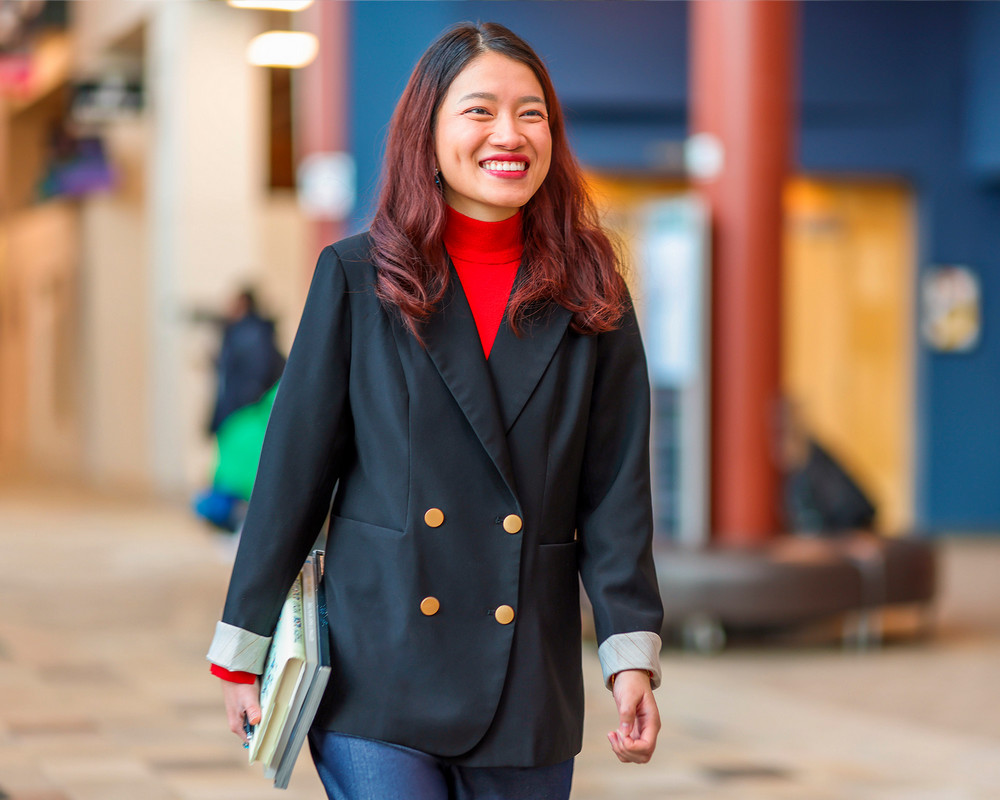
Learning the Language
Breaking Barriers to Success with English Language Support
"I heard that Regina was a very good place for newcomers and I thought the weather was going to be good," laughs Alice Duong who travelled from Vietnam to Regina in 2018 to enrol in the English for Academic Purposes (EAP) program.
The program, designed to help students achieve the English proficiency necessary to pursue undergraduate classes at the University of Regina, was Duong’s first step in pursuing a new career.
“I studied pharmacy in Vietnam but I felt like I wanted to change my career. I decided to see what a foreign education and life in Canada would be like. Canada’s cultural diversity was appealing and I thought it would be a good place to learn English.”

Although her initial impressions proved to be true, her introduction to Regina was a challenge. “The language barrier was real. Students in my class were from other countries and we didn’t share the same language so we were all motivated to learn English as a way to connect.”
Karlie Butler, Head of English Language Programs and Short-Term Program Coordinator with CCE says the initial learning curve can be steep. “Developing language skills is just part of what our students learn. We also help them overcome the culture shock and introduce them to academic life in Canada, which can be different from their home countries.” “The program definitely helped me academically,” says Duong. “I learned how to structure essays in a Canadian way which was different from how I did it in Vietnam.”
I owe a lot to the EAP program. It gave me such a good start and allowed me to become the best version of myself.—Alice Duong, U of R EAP graduate
The EAP program is designed for more than just international students needing to achieve the English Language Proficiency to start their undergraduate studies. “We’re seeing more students wanting to build their language skills at the same time as they are enrolled in an undergraduate program,” says Butler. “This program offers students opportunities to build English language skills while earning credit through EAP 100 and 101, an opportunity available to students in programs with open electives. We are beginning to see more and more interest in these courses from current undergraduate students looking for English language support to help them succeed in their studies.”
The depth of instructor support plays a big role in ensuring students are able to achieve their goals. “A lot of our instructors have lived abroad or studied languages, so they have an understanding of what it’s like to learn in a new and unfamiliar place or to try to communicate in a new language,” notes Butler. “There’s a level of caring and an appreciation of the value of multiculturalism they bring to their work.”

During her first year as a student, Duong also began building connections within the classroom and the broader community, including with her EAP advisor. “My advisor was a great mentor and helped me in so many ways. With her help, I began volunteering and one of the ways I was able to give back was by translating CCE’s English as a Second Language policy into Vietnamese.”
Her experience volunteering also provided the insight she needed to determine her next educational step. “One of the organizations where I worked employed social workers who helped people with disabilities. Giving back to my community in that way really appealed to me.”
Duong applied and was accepted into the Bachelor of Social Work. She graduated in 2024 with an 82% GPA. Her high level of academic achievement and outstanding volunteerism did not go unnoticed.
In 2024, Duong was awarded the Dean’s Medal and University Prize.
Now happily settled in Regina, she’s looking forward to landing her dream job which will allow her to continue working with immigrants and people with disabilities.
Learn more about English for Academic Purposes.
“I love Regina—well, maybe not the winter, but the nature here is awesome. I’m continuing to go to a lot of social events connected to the University and still trying to improve my skills. I’d like to learn French and Chinese which would be helpful in working with people arriving from other countries.”
The future looks bright for this aspiring newcomer and social worker. “I owe a lot to the EAP program. It gave me such a good start and allowed me to become the best version of myself.”
Banner photo credit: University of Regina